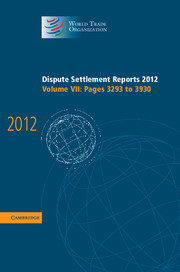Book contents
- Frontmatter
- TABLE OF CONTENTS
- CHINA – MEASURES RELATED TO THE EXPORTATION OF VARIOUS RAW MATERIALS
- Contents
- CASES CITED IN THESE REPORTS
- ABBREVIATIONS USED IN THESE REPORTS
- I INTRODUCTION
- II ARGUMENTS OF THE PARTICIPANTS AND THE THIRD PARTICIPANTS
- III ISSUES RAISED ON APPEAL
- IV THE PANEL'S TERMS OF REFERENCE
- V THE PANEL'S RECOMMENDATIONS
- VI APPLICABILITY OF ARTICLE XX
- VII ARTICLE XI:2(a) OF THE GATT 1994
- VIII ARTICLE XX(g) OF THE GATT 1994
- IX FINDINGS AND CONCLUSIONS IN THE APPELLATE BODY REPORT WT/DS394/AB/R
- X FINDINGS AND CONCLUSIONS IN THE APPELLATE BODY REPORT WT/DS395/AB/R
- XI FINDINGS AND CONCLUSIONS IN THE APPELLATE BODY REPORT WT/DS398/AB/R
- ANNEX I Request for the Establishment of a Panel by the United States, WT/DS394/7
- ANNEX II Request for the Establishment of a Panel by the European Communities, WT/DS395/7
- ANNEX III Request for the Establishment of a Panel by Mexico, WT/DS398/6
- ANNEX IV Notification of an Appeal by China, WT/DS394/11, WT/DS395/11, WT/DS398/10
- ANNEX V Notification of an Other Appeal by the United States, WT/DS394/12
- ANNEX VI Notification of an Other Appeal by the European Union, WT/DS395/12
- ANNEX VII Notification of an Other Appeal by Mexico, WT/DS398/11
- Contents
- TABLE OF WTO CASES CITED IN THESE REPORTS
- GATT DISPUTE SETTLEMENT AND WORKING PARTY REPORTS
- ABBREVIATIONS OF MEASURES, EVIDENCE, AND OTHER INSTRUMENTS REFERRED TO IN THIS RULING
- TABLE OF ABBREVIATIONS
- I INTRODUCTION
- II FACTUAL ASPECTS
- III PARTIES' REQUESTS FOR FINDINGS AND RECOMMENDATIONS
- IV ARGUMENTS OF THE PARTIES
- V ARGUMENTS OF THE THIRD PARTIES
- VI INTERIM REVIEW
- VII FINDINGS
- VIII CONCLUSIONS AND RECOMMENDATIONS
- Cumulative List of Published Disputes
VIII - ARTICLE XX(g) OF THE GATT 1994
from CHINA – MEASURES RELATED TO THE EXPORTATION OF VARIOUS RAW MATERIALS
Published online by Cambridge University Press: 03 January 2018
- Frontmatter
- TABLE OF CONTENTS
- CHINA – MEASURES RELATED TO THE EXPORTATION OF VARIOUS RAW MATERIALS
- Contents
- CASES CITED IN THESE REPORTS
- ABBREVIATIONS USED IN THESE REPORTS
- I INTRODUCTION
- II ARGUMENTS OF THE PARTICIPANTS AND THE THIRD PARTICIPANTS
- III ISSUES RAISED ON APPEAL
- IV THE PANEL'S TERMS OF REFERENCE
- V THE PANEL'S RECOMMENDATIONS
- VI APPLICABILITY OF ARTICLE XX
- VII ARTICLE XI:2(a) OF THE GATT 1994
- VIII ARTICLE XX(g) OF THE GATT 1994
- IX FINDINGS AND CONCLUSIONS IN THE APPELLATE BODY REPORT WT/DS394/AB/R
- X FINDINGS AND CONCLUSIONS IN THE APPELLATE BODY REPORT WT/DS395/AB/R
- XI FINDINGS AND CONCLUSIONS IN THE APPELLATE BODY REPORT WT/DS398/AB/R
- ANNEX I Request for the Establishment of a Panel by the United States, WT/DS394/7
- ANNEX II Request for the Establishment of a Panel by the European Communities, WT/DS395/7
- ANNEX III Request for the Establishment of a Panel by Mexico, WT/DS398/6
- ANNEX IV Notification of an Appeal by China, WT/DS394/11, WT/DS395/11, WT/DS398/10
- ANNEX V Notification of an Other Appeal by the United States, WT/DS394/12
- ANNEX VI Notification of an Other Appeal by the European Union, WT/DS395/12
- ANNEX VII Notification of an Other Appeal by Mexico, WT/DS398/11
- Contents
- TABLE OF WTO CASES CITED IN THESE REPORTS
- GATT DISPUTE SETTLEMENT AND WORKING PARTY REPORTS
- ABBREVIATIONS OF MEASURES, EVIDENCE, AND OTHER INSTRUMENTS REFERRED TO IN THIS RULING
- TABLE OF ABBREVIATIONS
- I INTRODUCTION
- II FACTUAL ASPECTS
- III PARTIES' REQUESTS FOR FINDINGS AND RECOMMENDATIONS
- IV ARGUMENTS OF THE PARTIES
- V ARGUMENTS OF THE THIRD PARTIES
- VI INTERIM REVIEW
- VII FINDINGS
- VIII CONCLUSIONS AND RECOMMENDATIONS
- Cumulative List of Published Disputes
Summary
345. China alleges that the Panel erred in interpreting the phrase “made effective in conjunction with” in Article XX(g) to mean that restrictions on domestic production or consumption must “be applied jointly with the challenged export restrictions”, and that “the purpose of those export restrictions must be to ensure the effectiveness of those domestic restrictions”.
The Panel's Findings and Arguments on Appeal
346. The Panel found that China's export quota on refractory-grade bauxite is inconsistent with Article XI:1 of the GATT 1994. China sought to justify this export quota pursuant to Article XX(g) of the GATT 1994, arguing that refractory-grade bauxite is an exhaustible natural resource that is scarce and requires protection.
347. The Panel first addressed the question of whether China's export quota relates to the conservation of refractory-grade bauxite. Based on its review of the evidence and arguments before it, the Panel found this not to be the case. The Panel nevertheless continued its analysis in order to determine whether the export quota on refractory-grade bauxite was “made effective in conjunction with” restrictions on domestic production or consumption, as required under Article XX(g) of the GATT 1994.
348. The Panel considered that, in order for a measure to be justified under Article XX(g), the measure must satisfy two conditions: (i) it must relate to the conservation of an exhaustible natural resource; and (ii) it must be made effective in conjunction with restrictions on domestic production or consumption.
- Type
- Chapter
- Information
- Dispute Settlement Reports 2012 , pp. 3441 - 3446Publisher: Cambridge University PressPrint publication year: 2014
- 4
- Cited by

